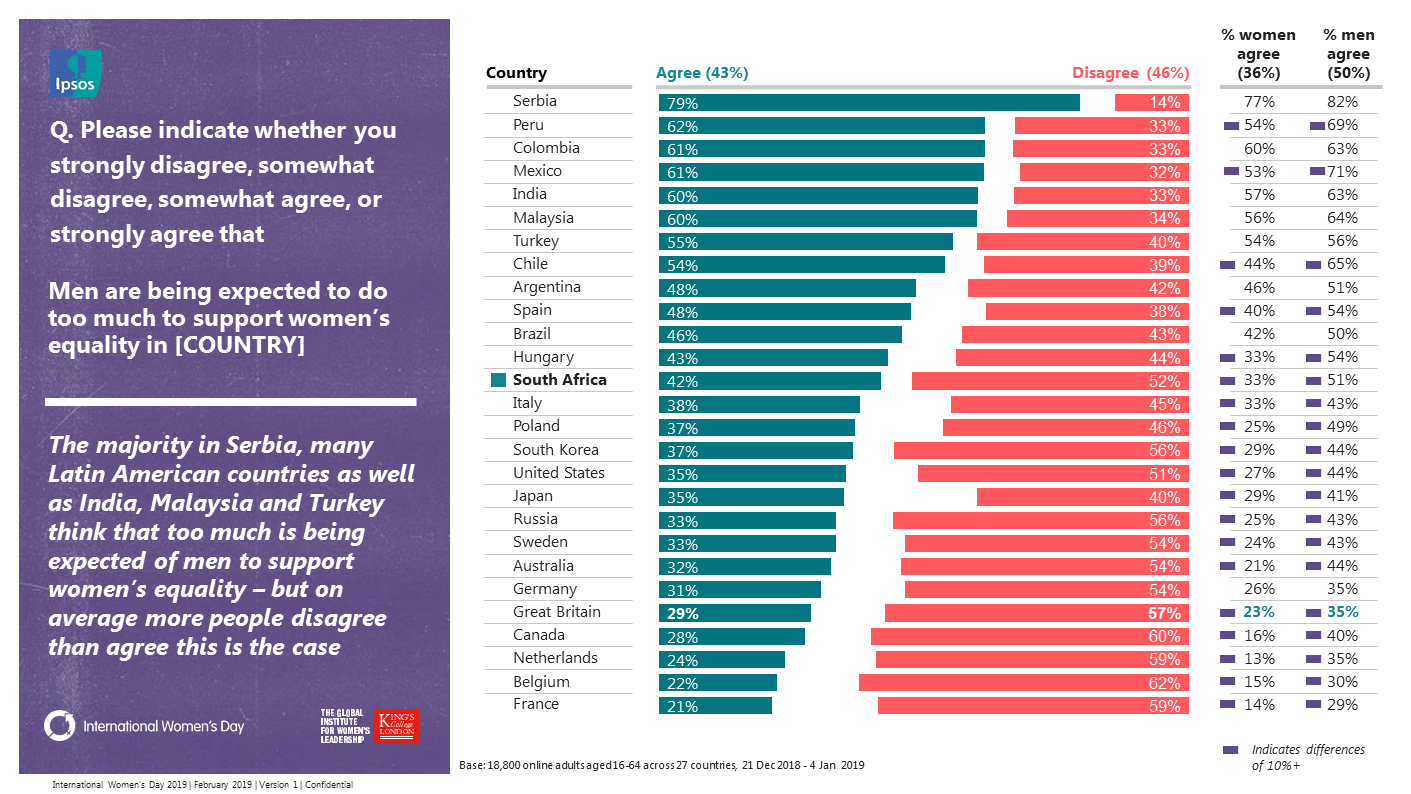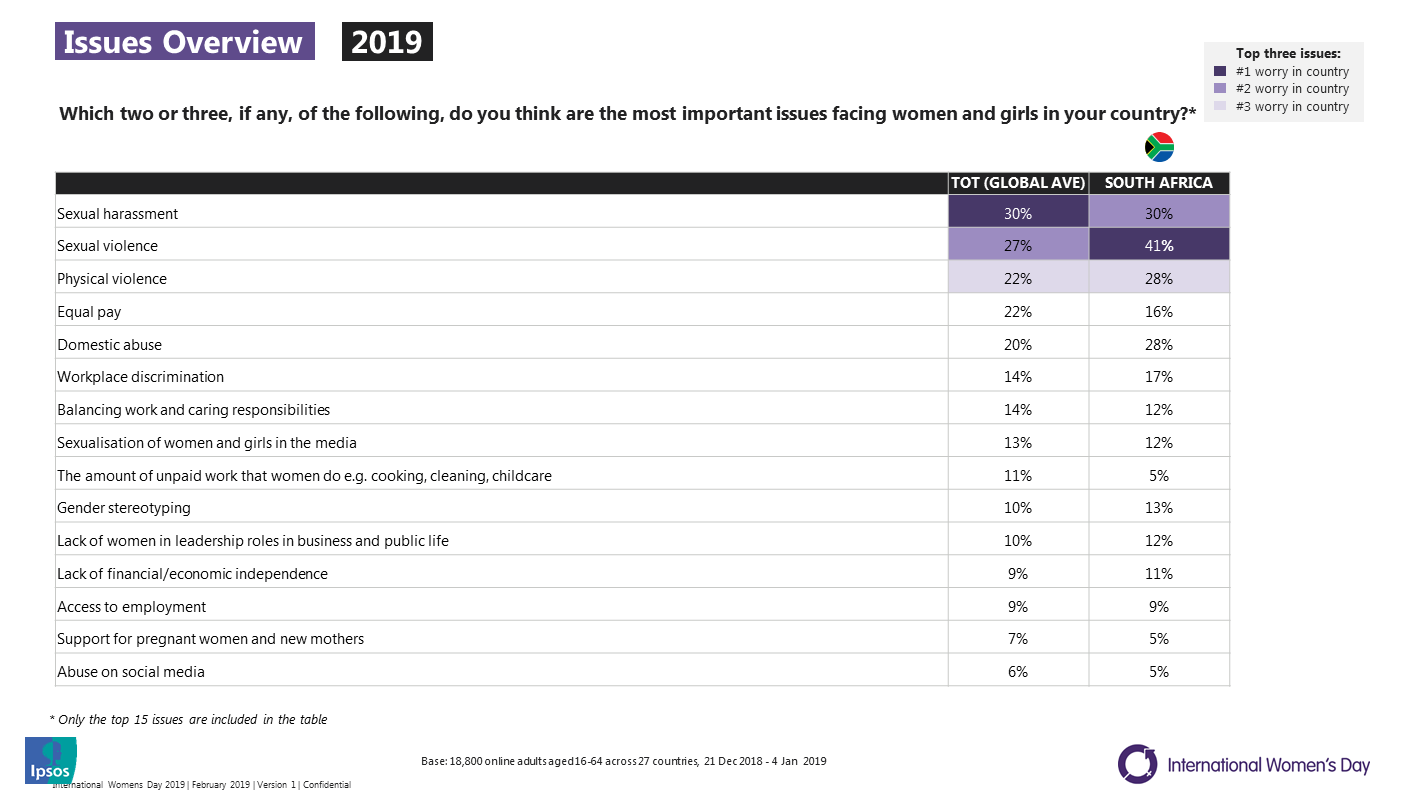Gender Equality Around the World
A new global study conducted by Ipsos in collaboration with the Global Institute for Women’s Leadership at King’s College London and International Women’s Day finds the majority of men agree that that women won’t achieve equality without their support but half believe they are expected to do too much to support women’s equality.
The Survey was carried out online among adults under 65 across 27 countries, meaning that the numbers for South African represent those that regularly access the Internet.
Two-thirds (65%) believe that women won’t achieve equality in their country unless men take actions to support women’s rights too. A quarter (25%) disagree. Three in five men (61%) agree compared to seven in ten women (69%). Agreement with this statement rises to 74% in Chile, 76% in Peru, 76% in Serbia and 75% in South Africa, but is lowest in Italy (53%), Poland (51%) and Japan (47%).
However, people are split on whether too much is being expected of men to contribute to in the fight for equality. Overall, 43% agree that men are being expected to do too much to support women’s equality in their country compared with 46% who disagree. Half of all men (50%) agree that too much is expected of them to support women's equality while a third (36%) of women do.
Opinions are similarly split in South Africa, but at least more than half disagree that too much is expected from South African men.

People still think it is easier to be a man than a woman in today’s society
- Globally, half (52%) believe there are more advantages to being a man than a woman in society today. Just over one in ten (12%) believe that being a woman is more advantageous than being a man whereas a quarter (26%) believe there are no differences between men and women. Men are more likely to say there is no difference than women (30% compared to 22%).
- Respondents in South Africa are most likely to say there are more advantages being a man (55%), compared to the 16% who say that it is better to be a woman, possibly pointing to the inequality in terms of gender in our society.
Close to half believe the push for gender equality hasn’t gone far enough
- More people disagree (49%) than agree (42%) that, when it comes to giving women equality, things have gone far enough. This marks a change from 2018 where 45% both agreed and disagreed with this statement – suggesting that perhaps the push for equality is gaining wider traction.
- Brits and the Japanese lead the charge in thinking things haven’t gone far enough (both 59%) followed by Australians (57%). Over half of South African respondents (53%) feel that the push for equality has not gone far enough.
- 44% of South African respondents identify themselves as feminists, which is higher than the global average. Globally, a third of people (33%) say they would describe themselves as a feminist. Worldwide, women are more likely to identify as a feminist than men (38% vs 28%).
The survey finds that there is still a long way to go to achieving gender equality but that attitudes are changing. People think women today will have a better life than women of their parents’ generation and there is a majority view that achieving gender equality is an important goal.
- Globally, half (50%) say that young women will have a better life than women from their parents’ generation. A quarter (23%) think it will be the same. For young men under the age of 35, 42% believe they will have a better life than men of their parents’ generation and 27% say it will be the same. Countries with the most positive outlook about women compared to their parents’ generation are Chile (75%), Colombia (69%) and India (66%). South Africa also has a fairly optimistic view for tomorrow’s women with 56% believing that this generation will have better lives than the generation preceding them. One in five internationally (21%) believe that young women will have a worse life than women of their parents’ generation and this rises to 45% in Turkey, 39% in Hungary and 35% in Serbia.
Personal Prioirities : Two-thirds of people globally (65%) say that achieving equality between men and women is important to them personally. Agreement among both men and women is high regarding this idea with three in five men (62%) agreeing and seven in ten (69%) women. Respondents in Peru (80%), Colombia (78%) and South Africa, Spain and Chile (all 76%) are most likely to agree that achieving equality between men and women is important to them personally whereas respondents in Japan (36%) and Russia (45%) and the Netherlands (52%) are least likely to say this.
Attitudes towards masculinity are changing – childcare is no longer seen as a woman’s job and the majority say they would be comfortable with a female boss
- In most countries childcare is no longer seen as the preserve of the woman; three-quarters globally (75%) disagree that a man who stays at home to look after his children is less of a man compared with just one in five (18%) agreeing. Agreement rises to 76% in South Korea and to 39% in India. Those most likely to disagree with this statement are Serbia (92%), the Netherlands (90%)[1] and Colombia (87%). In Great Britain, only 13% agree that a man staying at home to look after his children is less of a man, while the vast majority (81%) disagree.
- Three-quarters of people globally (75%) say they would be comfortable with having a female boss. In South Africa, this figure is 70% and 24% say they would be uncomfortable with a female boss. Only 17% say they would feel uncomfortable. Men are more likely to say that they would feel uncomfortable if their boss was female (20%), compared to women (14%). Unease with having a female boss rises mostly among people in India (35%) South Korea (31%) and Malaysia (28%). People in Serbia (4%), the Netherlands (8%) and France (10%) are least likely to say they would feel uncomfortable.
Sexual harassment, sexual violence, physical violence, equal pay and domestic abuse are still seen as the top issues facing women across the globe
- Three in ten people globally (30%) pick out sexual harassment as the top issue facing women, which is in line with findings in 2018 when the figure was 32%. Respondents in Peru (54%), Turkey (51%), Argentina (45%), Malaysia (40%) and Mexico (40%) are significantly more likely to see sexual harassment as the top issue facing women than average.
- Sexual violence is seen as the top issue in Colombia (45%), Spain (44%) and South Africa (41%), while the top issue for Peru is physical violence (55%). Concerns over women’s safety dominate, yet we know from previous research that people massively underestimate the scale of the problem.[2]

- Equal pay is highlighted as much more of an issue in many European countries such as Belgium (36%), Hungary (33%), Netherlands (33%), Germany (32%), Sweden (31%) and Great Britain (29%), as well as among people from Chile (38%) and Canada (35%).
Equal pay and tougher laws to end violence and harassment against women seen as the key to helping achieve gender equality. Almost 4 in 10 (39%) of South Africans believe that tougher laws to prevent violence and harassment are necessary.
- Globally, the top actions that people feel would help to achieve equality between men and women are employers paying women the same as men for the same work (36%) and tougher laws to prevent violence and harassment against women (35%). The majority (69% and 68%) believe these respective actions will have a positive impact in achieving equality.
- Equal pay is much more likely to be picked out in Belgium (53%), Hungary and the Netherlands (both 49%). In Britain two in five select this (40%). Tougher laws to end violence and harassment are more likely to be picked out in Peru (56%), Colombia (54%) and Serbia (51%).
- Close to half (48%) believe that the area of life where not enough is being done to achieve equal rights between men and women is looking after children and the home.
- Education is the area where people think equality will be achieved first - close to half (47%) are confident that discrimination against women in education will have ended in 20 years’ time. 35% of South Africans agree that this is the key to helping achieve equality for women and girls.
Technical details
- Field dates were Friday, December 21st 2018 to Friday, January 4th 2019
- 16 of the 27 countries surveyed online generate nationally representative samples in their countries (Argentina, Australia, Belgium, Canada, France, Germany, Great Britain, Hungary, Italy, Japan, Netherlands, Poland, South Korea, Spain, Sweden, and United States).
- Brazil, Chile, Colombia, India, Malaysia, Mexico, Peru, Russia, Serbia, South Africa and Turkey produce a national sample that is more urban & educated, and with higher incomes than their fellow citizens. We refer to these respondents as “Upper Deck Consumer Citizens”. They are not nationally representative of their country.
- Approximately 1000+ individuals participated on a country by country basis via the Ipsos Online Panel with the exception of Argentina, Belgium, Chile, Colombia, Hungary, India, Malaysia, Mexico, Netherlands, Peru, Poland, Russia, Serbia, South Africa, South Korea, Sweden and Turkey, where each have a sample approximately 500+.
[1] This is almost contra-intuitive of our view of the Nethrlands as a progressive country and can be a result of the changing population composition in the Netherlands – with an ageing population and more immigrants.
[2] https://www.ipsos.com/en-uk/international-womens-day-global-misperceptions-equality-and-need-press-progress

